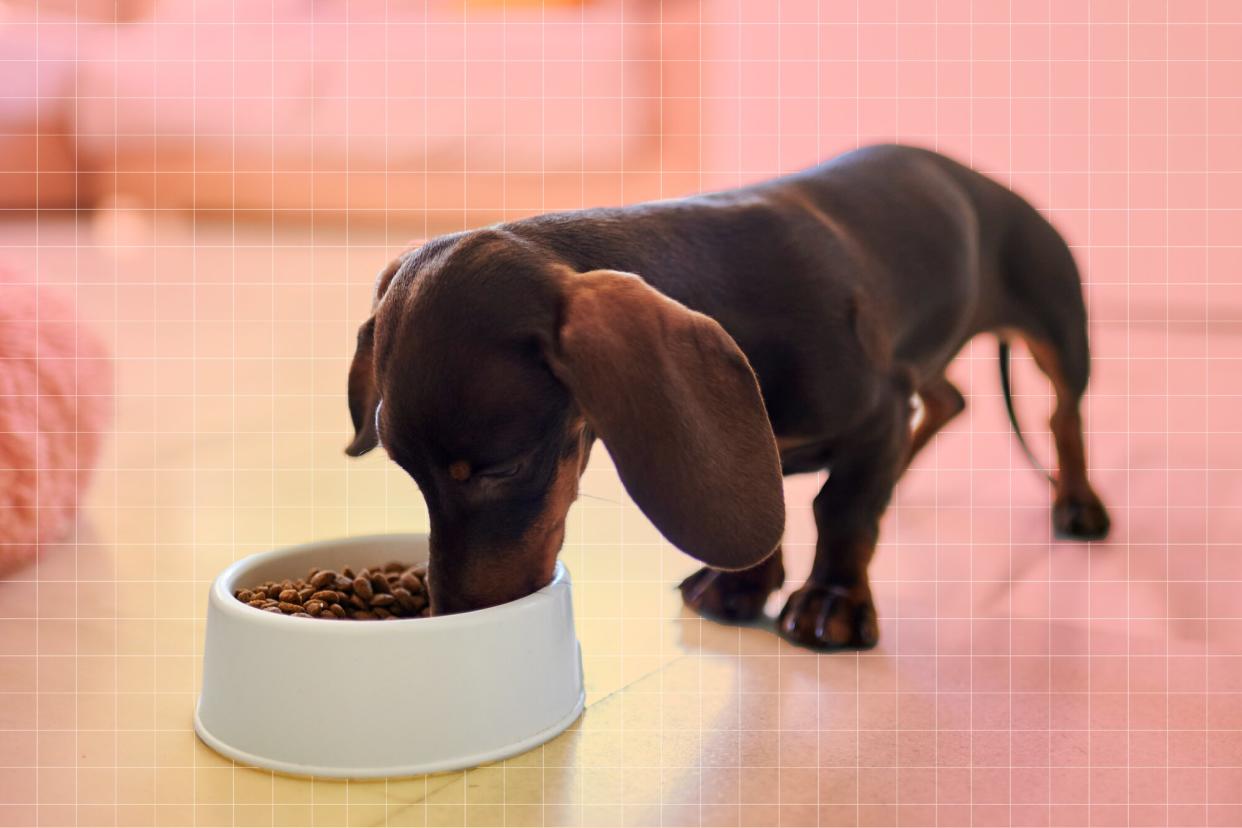The 6 Healthiest Ingredients to Look for in Pet Food

Getty Images / Westend61
Food is love, and that goes for your four-legged family members, too. But while they may be perfectly happy with everything from store-brand kibble to table scraps, the quality of your pet's diet has a huge impact on how long and healthy a life they live.
Related: The Best Vegetables for Dogs and Cats
"Unfortunately in veterinary medicine, we're seeing a lot of diseases," says Judy Morgan, D.V.M., a veterinarian based in Raleigh, North Carolina, and the author of Yin & Yang Nutrition for Dogs. What we feed our pets, she believes, is a big part of the reason why.
Pet food, like human food, has become a lot more processed since the 1970s, with added preservatives to help keep it shelf-stable. "Dry kibble is cooked multiple times at very high heat," she says, which can destroy certain nutrients. "If we want to improve the health of our pets and keep them around longer, we need to change how we're feeding them," Morgan says.
As pet owners have begun realizing this, they've started looking for healthier alternatives. But the nutritional needs of your dog or cat are different from your own, and what they need isn't always clear-cut.
"People say pet food is the hardest thing to shop for," says Danielle Bernal, D.V.M., a veterinarian with Wellness Pet Company. "There are more than 800 different dog- and cat-food brands." And while human-grade raw-food diets may be great from a nutritional standpoint, they're not always affordable or convenient. "More than 80% of pet owners are still using dry food, even if they're experimenting with raw or wet food or homemade formulas," Bernal says. Ultimately, she says, you want to get the best-quality nutrition you can afford, whatever that happens to be. The best way to ensure you're doing that? Look at the ingredients list. Here are what veterinary experts say matters.
1. Meat
"Meat should be the first ingredient," says Morgan. Cats are obligate carnivores, meaning they need meat to survive, and while dogs are technically omnivores that can survive on plant-based diets, they don't necessarily thrive on them, she says. She prefers organ meat such as heart or liver because it's more nutritionally dense.
"Fresh meat has the amino acids, vitamins and minerals your pet needs, and is most digestible," says Bernal. But because it is mostly water, many formulas also include some kind of dehydrated protein, such as turkey or chicken meal, to pump up the protein.
Related: What Is Protein & Why Do You Need It?
2. Quality carbs
Carbohydrates are as hotly debated a topic for pets as for people, says Bernal. The natural food category grew so quickly, in part because of grain-free foods. But unless your pet has a true allergy or sensitivity, some carbs are OK. She recommends that no more than 30% of the food's total calories come from carbs, and they should be things like oats, pumpkin, sweet potato, leafy greens, apples, blueberry or papaya. Morgan looks for organic or non-GMO vegetable matter.
3. Healthy fats
The right fats help promote healthy skin and a shiny coat and may help prevent the chronic inflammation associated with various diseases, says Bernal. Omega-3 fatty acids are one kind, and you can find them in things like fish or flaxseed oil, olive oil and egg yolks. For packaged foods, Bernal advises looking for the guaranteed analysis on the label, which ensures ingredients are present in a large-enough quantity to matter.
4. Probiotics
Research indicates that pets have colonies of healthy bacteria in their digestive tract just as humans do, and may benefit from probiotics, foods that help maintain that balance and variety of microorganisms. You can look for specific bacterial strains such as Lactobacillus acidophilus or Bifidobacterium lactis. The tricky thing about probiotics, says Bernal, is that they need certain temperatures and other conditions to stay alive. Again, the guaranteed analysis on a product will show how many live bacteria there will be at the end of its shelf life.
5. Prebiotics
Research is also shedding light on the fact that probiotics need specific kinds of fuel to survive. These are known as prebiotics, and are usually fibers like inulin or chicory root. In some cases, these may help prevent unhealthy bacteria from attaching to the digestive tract and otherwise help keep your pet's digestive system healthy. Taking prebiotics with probiotics is a good approach for you and your pet.
6. Calcium
Like us, our pets need a variety of minerals and vitamins to stay healthy and active, but calcium is especially important because dogs, especially puppies, need more of this bone-building mineral than we do. It can come from ground eggshells or bones (never give your dog whole bones) and may be listed as "bone meal" on labels. Fish is also a good source of calcium, as well as healthy fats and protein, so is a good way to meet a variety of nutritional needs.

